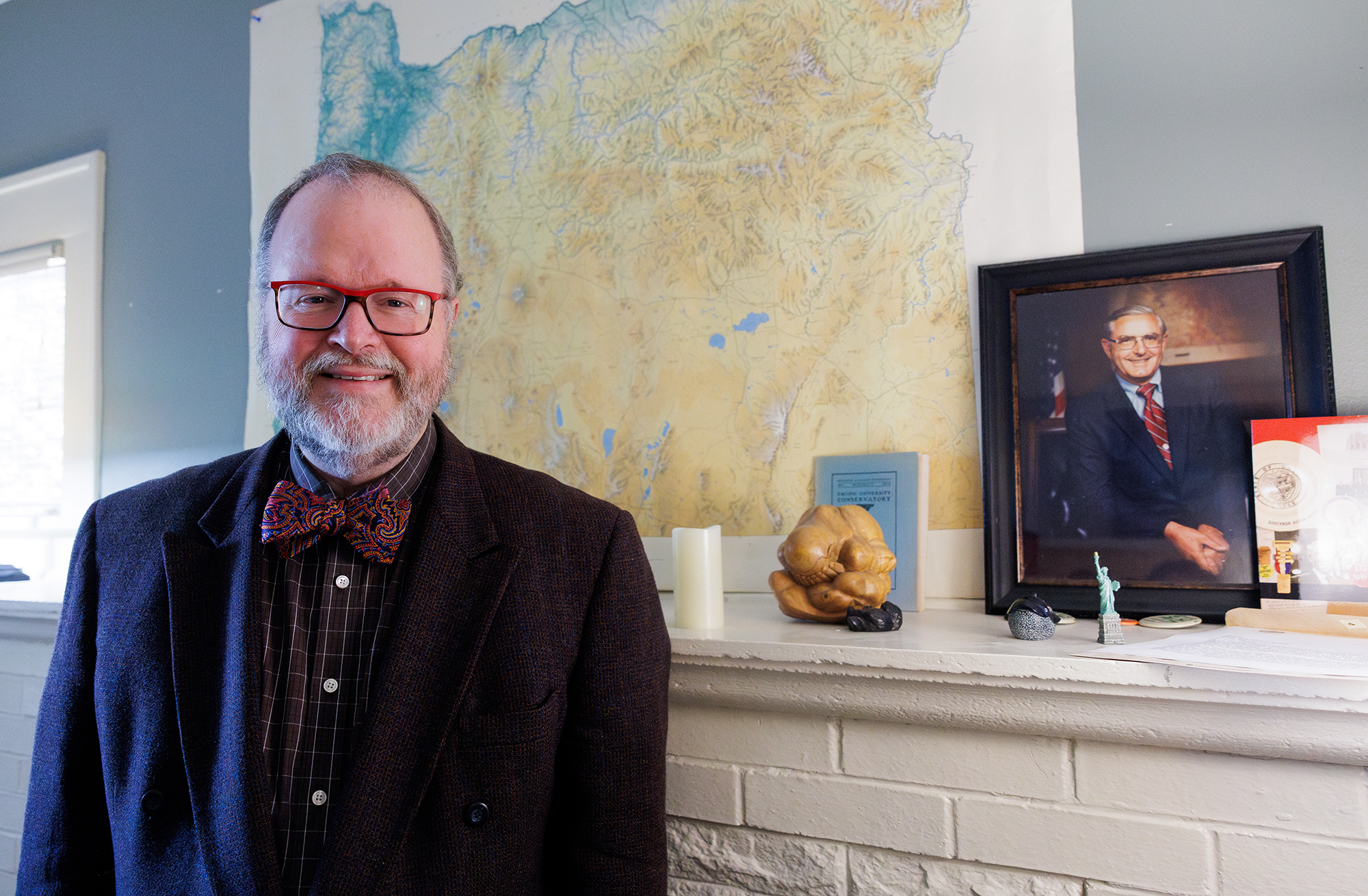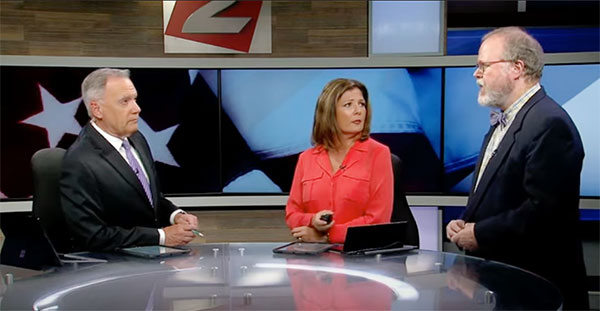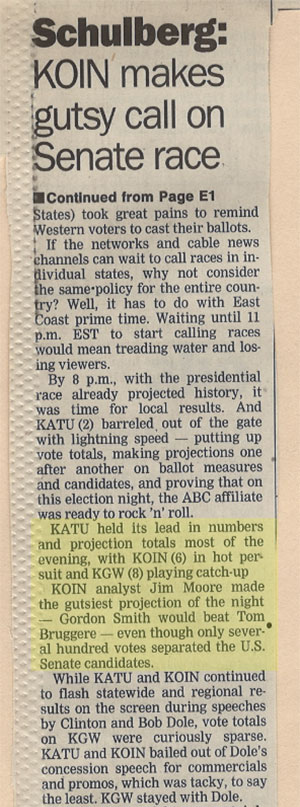Jim Moore Political Analysis: Just Add Water

It may come as a surprise that Oregon’s most sought-after political analyst didn’t own a cell phone until three years ago.
The decision was a matter of survival for Jim Moore, associate professor of political science at Pacific University and director of political outreach for the university’s McCall Center for Civic Engagement. He didn’t want to answer calls during his commute, on vacation or during class.
But it is safe to say that if you are a reporter keeping a finger on the pulse on politics in Oregon, you know how to get hold of Moore. He estimates that as many as 200 reporters know how to reach him, whether in his Pacific office or his home in unincorporated Washington County.
“I make it clear to reporters that they can call my home number. On my phone here in the office, I tell people that if they have my home number, feel free to use it,” Moore said. “I am open from 6 in the morning to 9 at night.”
It is that sort of accessibility and a passion for educating the public about the issues of the day that have made Moore the most popular political analyst in the state since the 1990s. Called “the most quoted political analyst in Oregon” by Oregon Business magazine, Moore estimates that he has spoken the reporters no less than 50 times a month in the two months leading up to the 2024 general election.
But the days of answering the phone before reading his first morning newspaper are ending. This presidential election will be the last for Moore, who will retire from media analysis work in January 2025 and from Pacific in May.
For over 30 years, Moore has been the voice that newspapers and broadcast outlets have turned to with political questions, from Portland’s mayoral race to numerous gubernatorial elections to nine presidential elections.
As former KOIN-TV journalist Mark Sanchez once put it: “Jim Moore political analysis. Just add water.”
Brett Reckamp, co-anchor of Portland’s Morning News on KXL-FM, where Moore does a weekly segment, appreciates that Moore has never been more than a phone call away.
“Like in sports, the best ability is availability,” Reckamp said. “Even before he takes off on vacation, we always seem to come up with some important political angles and topics that inform and intrigue our viewers. We can always count on Jim for sound commentary and perspective.”
EVERY ELECTION IS IMPORTANT
For many voters, the 2024 U.S. presidential election is the most important one in U.S. history. Moore does not dispute that, but his qualifier has a catch.
“We have had 53 presidential elections and every one of them was the most important ever,” he said, “but this one feels different. It is wild and unpredictable in so many ways. There are things that you can’t predict and that is what makes it so fun to figure out.”
While the rhetoric of the 2024 race sparks emotion on both sides, that is not what Moore believes makes his final race as an analyst so unique. The divisiveness has been present for decades, he said, but is amplified instantly today by social media. What makes it unique is the historical context that this race includes a former president running again after losing the office. That hasn’t happened since Herbert Hoover sought the Republican nomination in 1940.
“It takes away the uncertainty. It takes away the hypotheticals,” Moore said. “We know what Kamala Harris is going to do because that’s what Joe Biden did. Donald Trump has been president before and he has been really active in the years since he was out of the presidency. It sets a kind of black-and-white clarity that we usually don’t have in races.”
 The challenge for Moore, whether in front of the television camera or in the classroom, is to present the races in an unbiased manner. His mission is to educate, not to tell voters how they should cast their vote.
The challenge for Moore, whether in front of the television camera or in the classroom, is to present the races in an unbiased manner. His mission is to educate, not to tell voters how they should cast their vote.
Moore gauges how unbiased his analysis is with three metrics. The first is making clear what the models are, whether it is historic party philosophies, polling data or trends. The second is relying on outside ideas to see if what he is thinking matches that of other political analysts. The third is public sentiment, which he says is the best barometer of whether his analysis is hitting that neutral mark.
“I hear from people all of the time and it’s always an equal number of people on the right and the left saying ‘You’re an idiot,’ or ‘You said exactly the right thing,’” Moore said. “If I am getting an equal response, then you’re probably doing exactly what you need to be doing.”
Steve Dunn, longtime anchor at KATU-TV, said that neutrality is a hallmark of his work with Moore.
“I’ve often wondered: Is Jim a Democrat? Is he a Republican? Independent? And that’s the way it should be,” Dunn said. “I’ve had viewers ask me what party he belongs to and I can honestly say I have absolutely no idea.”
(Spoiler Alert: Moore’s voter registration is unaffiliated.)
A FAMILY BUSINESS
In the Moore family, the intersection of politics and media was simply a way of life.
Moore’s parents, Tam and Ann, met at Oregon State University, where they were both on the staff of the student newspaper, the Daily Barometer. Upon graduation in 1956, many members of the Barometer staff, including the Moores, were recruited by Northwest broadcast pioneer William Smullin to start the news operation at KIEM-TV in Eureka, California, where Jim Moore was born.
Tam eventually became news director at Smullin’s flagship station in Medford, KOBI-TV, resigning in 1974 for a successful run for election as Jackson County commissioner.
From an early age, thanks to his parents’ influence, Moore was talking and analyzing politics. He was so versed in the topic that by the time he graduated from Medford High School, he was teaching the civics class that he was a student in.
“In 11th grade, we had a civics teacher that wasn’t doing a good job,” Moore said. “He and I talked, and I ended up teaching the class. I could provide more clarity for my fellow students.”
That passion for educating followed him to Stanford University and eventually Northwestern University, where he earned his PhD in political science in 1995. During his time at Northwestern, the state of Illinois did not produce voter pamphlets to educate about the candidates. So Moore created his own and sold it for a quarter per copy.
It wasn’t long after Moore joined the faculty at the University of Portland in the early 1990s that the media came calling. His first appearance on KATU, in 1991, had little to do with his media savvy and more to do with a challenge to a reporter by Lon Mabon, the leader of the conservative Oregon Citizen’s Alliance, who criticized the station’s use of a political analyst from Portland State University.
“Lon Mabon said to the reporter, ‘Don’t go to get those liberals at Portland State to talk about this.’ So they called the University of Portland and asked if they had anyone who could talk about the story. And so I did.”
Within a year, Moore was calling elections for KOIN and making appearances on all four Portland-area television stations. Today, he regularly appears on KATU’s “Your Voice, Your Vote” and makes occasional appearances on the other three stations.
 It was in 1996, though, when Moore firmly put his name in the minds of editors and news directors. Working as an analyst for KOIN, Moore made an early call in the contentious race for U.S. Senate for Republican Gordon Smith over Democrat Tom Bruggere despite the fact that Smith led by just a few hundred votes.
It was in 1996, though, when Moore firmly put his name in the minds of editors and news directors. Working as an analyst for KOIN, Moore made an early call in the contentious race for U.S. Senate for Republican Gordon Smith over Democrat Tom Bruggere despite the fact that Smith led by just a few hundred votes.
Termed a “gutsy call” by The Oregonian, Moore made it based on data from the Bullet Poll (a poll that only KOIN used locally), which factored in the trends of both voters at the polls and absentee voters. He was right. When the election was certified, Smith won by four percentage points in the last of the 1996 Senate elections to be determined.
“In that particular race, I walked into the newsroom and they turned and gave me a standing ovation,” Moore said. “Newsrooms never do that.”
AN EXTENSION OF THE CLASSROOM
Moore understands that politics and the media go hand-in-hand. In fact, Moore views the work that he does with the media as a natural extension of what he does in the classroom at Pacific University.
“It’s putting that academic work in the real world,” Moore said. “I am someone who wants to take what the theoretical is, the academic, and I want to get it out there in the world where it’s actually going to do something rather than being in this closed, academic politics world.”
Likewise, Moore’s students appreciate his global view of the political world and how his work adds current relevance to the educational experience. It’s real and relevant.
“We’re not doing history all of the time,” he said. “It’s happening now. Here’s what we are using to look at this issue and here are three ways to think about it.”
Dunn, the longtime KATU anchor, said that he learns something every time they go on the air together.
“I feel like I have studied for a final exam after every interview with Jim,” Dunn said. “His knowledge is so incredibly vast. I often think about how fun it would be to have him as a professor. Whenever someone asks me a political question, I quote Jim Moore.”
Reckamp echoes Dunn’s appreciation for Moore’s vast knowledge. “He is a lover of history and enjoys bringing in factoids to the conversation that maybe no one outside of the Oregon Historical Society might have realized,” he said. “He has the breadth of knowledge to easily move from city to county to statewide and national candidates and issues. I could pick his brain for hours if we would allow.”
Where many institutions would not view media analysis work as truly academic, Moore appreciates that Pacific has embraced his media work as scholarship. He does not attend conferences or publish in academic journals like many of his peers. Moore believes that the media gives his work purpose and reaches more people.
“In an academic sense, people want to see you publish in the best journals. I’m all on the media side,” Moore said. “It’s really interesting because, in the regular political science world, what I do is not valued at all. Pacific, however, gave me a way to make it work.”
Moore will give his final off-campus political talk in January 2025. He will retire from Pacific in May following a 22-year career in Forest Grove and 35 years in higher education.
When he walks away, it will be final. No one-off television interviews, no teaching classes as an emeritus professor. He is looking forward to a lot more traveling with his wife and less time watching debates and State of the Union addresses. After three decades of instant analysis, just add water, the spigot will close.
Dunn said Moore’s retirement will create a void in the media community. “Jim has always been my go-to for everything in the political work,” he said. “Plus, he wears great ties. And trust me, I’m going to miss every bit of it.”
“Our conversations often go quite longer than necessary,” Reckamp said. “I just pepper him with things that I have heard from pundits on both sides just to hear his response. He is a true gem and he will be greatly missed on the air.”
Moore admits that he will miss being the guy that the media depends on. He will miss being recognized by everyone in the Oregon State Capitol in Salem. And he will miss the adrenaline rush that comes around biannually on the first Tuesday in November.
“I’m going to miss the excitement of election season,” Moore said. “Election season is like the Super Bowl every two years. It’s absolutely great.”


